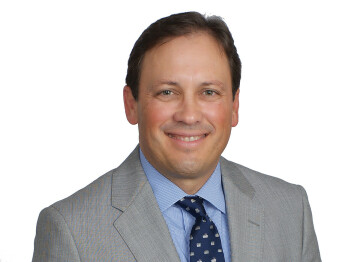CCFBank: Keeping the Valley in Sharp Focus, Even Amid a Pandemic
V1 Staff |

You might be wondering what Modicum Brewery – a brewery and taproom in Altoona – and CCFBank have in common. The answer: a shared love of the Chippewa Valley. And a vault that’s impossible to move. See, the now-brewery location once was the first CCFBank, started in 1938. As the bank expanded and moved, CEO of CCFBank Stephen Bianchi said there’s no way they could move the giant vault, weighing several tons, from one building to another. So you can find footprints of this bank all around the Chippewa Valley community. We had the chance to sit down and chat with Bianchi about how CCFBank is keeping its focus on the Chippewa Valley – even amid a pandemic.
Q: What are some of the core values of CCFBank?
Stephen Bianchi: Banking is a very personal service, and we believe integrity is really important to building trust in our relationships with others. That means we are sincere, kind, fair, and just in our dealings with our customers and our colleagues. We’ve got a really committed team here. We encourage innovation and sustainability, promote collaboration and teamwork. We think those are critical skills in our business and these values really seem to anchor us well.
Q: What kind of community involvement does CCFBank have with the Chippewa Valley? How does it support local?
While we serve many communities in Wisconsin and Minnesota, we direct a proportionally larger investment through colleague time, talents, and financial support to nonprofits and economic development efforts in the Chippewa Valley because that’s where our business is more concentrated. We have supported our schools and their athletic endeavors – such as supporting the Altoona School District Track & Field Project – among other community projects.
Most recently, we contributed $225,000 and over 2,000 gallons of milk toward the Milk Challenge throughout our banking footprint to organizations that provide meals or food items to those who needed help, as a direct result of the pandemic. We wanted to be responsive to what we observed going on in our communities and with dairy farmers. We also redirected some of our marketing budget to help, knowing that when you’re all locked in at home, marketing looked a bit different and families aren’t spending money in the same way. The velocity of the business changes – and we’ll be there to support it.
The (Chippewa Valley) Air Show is another example where we take a leadership role through financial support and volunteerism with the event. This year it is was canceled. That’ll get picked up in the future, and we’ll continue to be involved. We do encourage our colleagues to be actively involved in their communities and support them by giving time away from their job to be a volunteer. If they need to take two hours off to participate in the air show as a volunteer, we support and encourage our team’s interest in community volunteerism.
Q: What is the CCF footprint?
Very simple. We’re headquartered here in Eau Claire where our administrative center resides, right in the Eastridge Center. We have 28 branch locations in northwest and south-central Wisconsin and southern Minnesota – 17 of those branches are in Wisconsin, and 11 are in Minnesota. We consider our major markets to be the Chippewa Valley region here in Wisconsin and Mankato, Minnesota. We also have a strong presence along Highway 53, which includes Rice Lake, Barron, and Spooner where we have branches. We recently expanded into Tomah, and have a growing presence in La Crosse. We acquired a bank down that way about a year ago. Then we have a string of what I would call more rural or agricultural-oriented markets, ranging from Ettrick to Osseo, Eleva, Strum, Mondovi, and Ellsworth in Wisconsin. There is a similar market along I-90 in southern Minnesota, which really takes you to Albert Lea, Wells, Blue Earth, and Fairmont.
Q: You’re kind of all over the place, then?
I would say we used to be all over the place and we’re concentrating our efforts into the geography that I described. In the past, we had branches in eastern Wisconsin and two branches in Michigan which we have exited. This company has been around since 1938. A lot of things happen over 82 years, so as a result of that, we’ve been really pulling our reins in, if you will, to this location. I think we’re fairly focused now, as compared to where we were. We do have some talented expertise spread across our geography, with a lot of people in our organization having backgrounds in community banking, from both smaller and larger organizations, and we’re very comfortable managing that geography and supporting businesses of all sizes within it. So the simplicity and efficiency of running the operation, compared to a more geographically dispersed operation, it has different dynamics to it. And we’re comfortable with that.

Q: What are some of your up-and-coming products and features?
This is not a time where most people are thinking about new products and services at all. They’re thinking about managing through the day-to-day. But over the past few years, we have been making investments to make sure we have the right products and services to support. As we have been expanding through acquisitions and organic growth, we have been investing heavily in technology so that we can deliver our services digitally and to improve the customer experience.
We all know the way of the world is technology, and I think the pandemic has accelerated that. Mobile banking with deposit and payment capabilities, has been available to our personal and business customers for a few years. And we have seen mobile acceptance rates really accelerate during the pandemic. Over the past three years, we have expanded our consumer banking roots to mortgage banking. In the past, we had not necessarily been a real active mortgage banking player, or a commercial and agricultural banking bank, so we’ve really expanded our focus on those business lines. And when you think about the markets we’re in, here for instance in the Chippewa Valley region, it’s more commercial, mortgage, consumer-oriented. Those same products apply when you get out into some of the more rural markets, but we have agricultural bankers that actively participate in helping farmers maintain and grow their business in the rural markets.
We have the ability to serve large communities and the small communities. We have made it a focus of ours to make sure that when we go into communities, that we have the products and services that will allow us to be a good provider, and a good bank partner, for really all ends of the spectrum of opportunities in those communities. We view the communities that we operate in as a reflection of who we are; if there’s agriculture, then we’re an agricultural lender and support that kind of business. If there’s more housing, more multi-families, we participate in helping developers field those kinds of projects; as well as helping somebody with their home equity line, basic installment loan, services for buying a car, a boat, and those kinds of things.
Q: How does CCF Bank think in terms of the future?
We can all see how the pandemic has changed our habits, how businesses have been adjusting, and that technological change has accelerated. We think this trend will continue, but we do believe strongly that interpersonal relationships, relationships with our customers, will not be replaced or become irrelevant. We think that relationship banking is important to our personal and business customers and it’s also very important to our colleagues. But we also know that convenience services like mobile banking, mobile deposits, the ability to pay bills online, are no longer a nice-to-have option; they are really expected.
Q: How have you navigated COVID-19?
I would say in one word: smoothly. We had a very robust business continuity and disaster recovery plan in place that we actually practiced twice in 2019, In addition, we already had remote work capabilities and we strengthened that in February as we saw the virus starting to spread in the U.S. Approximately 50% of our colleagues can work remotely, and we’re able to space key departments throughout some of our facilities where remote work was not possible, so we could keep our employees safe. Our branch lobbies are available on a bank-by-appointment basis to protect the health of our colleagues, our customers, and our community. I think we’ve maintained that posture since the very beginning when we had to make the decision to close our lobbies and really serve customers mainly through the auto-bank, unless they needed to make an appointment to come in. We’re glad we did that because some banks decided to reopen more recently, and now we’re finding they’re closing back up because they’re seeing case counts growing quickly.
We have weekly, all-colleague meetings to ensure we communicate effectively to everybody in the organization, and we use it as a time to collaborate and answer questions. We’re really appreciative of and thankful for our clients that have been understanding and supportive of keeping our lobbies closed because they want to be kept safe too. They want our employees and colleagues to be kept safe and healthy as well. I think it all works together.
And we’re not in a rush. I mean, who knows when we can all feel safe and there’s really an all-clear? Is that when there’s a vaccine? Is that when we have herd immunity? Nobody really knows. So we’re going to continue to operate this way. We consistently ask our teams, “How are customers feeling about it?” “What are you thinking about it?” and we’re not going to make one decision for all branches. If we have a branch that thinks it’s a good idea to open up, then we may do that. But we’re obviously fully prepared with plenty of disinfecting wipes and hand sanitizers, we’ve got plexiglass guards in place, and obviously we’ll encourage the use of masks.
Q: How do you keep local roots as a part of your business, specifically in the Chippewa Valley?
The origins of our company date back to 1938, pretty much where our administration HQ sits today at the Eastridge Center. Across Fairfax, behind the Eastridge Center is the original branch for the location in Altoona, and it is still the largest branch in the company. Of our roughly 270 colleagues, 74% are located in Wisconsin, and the Chippewa Valley region accounts for 50% between our branches and the administrative center. So, it’s easy to see how we can stay connected.
CCFBank
Locations throughout Chippewa Valley
(715) 836-9994
www.ccf.us
This post was produced through a partnership
with CCFBank ... Learn more!



















